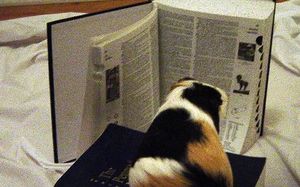User:NoNamesLeft/Rodent
A Rodent Scholar, named after the Orderum Rodentus of the Animal Kingdom, is an honorary postgraduate "student" who contributes to scientific research at centers of learning ranging from Oxford University in England to Wheeling Jesuit University in West Virginia. Rodent Scholars were the first large-scale group of "volunteers" for international scholarship in the fields of Medicine, Pharmacology, and Vivisection. They are widely considered the "world's most prolific research subjects" by public sources such as The Daily Telegraph and Animal House.
Nature of Scholarship[edit | edit source]
All Rodent Scholars become affiliated with an institution of higher learning and enjoy access to free cage facilities, water bottles, feed bowls, and invasive needle-prodding. Rodent Scholars may study within any full-time postgraduate course offered by their university so long as it involves administration of powerful experimental drugs, undergoing untested surgeries, or enduring unusual mental hardships. Each Rodent Scholar is the recipient of a scholastic award that lasts a minimum of two years or the unnatural lifespan of the Rodent Scholar, whichever is longer. Applications for early release from the program as summarily rejected as a matter of course.
The cost of university and college research fees are paid by the International Rodent Scholar Trust Fund. In addition, Rodent Scholars receive a monthly maintenance supply of food and water, which may or may not be laced with mutation-inducing radiation. The value of a Rodent Scholarship varies depending on the academic field and the success of the research undertaken. For example, an American Rodent Scholar who successfully grows a human ear on his back may be worth hundreds of thousands of dollars; by contrast, a Rodent Scholar who is force-fed a diet of pure cocaine and dies within minutes may actually count as a negative value due to the cost of disposing of its drug-addled corpse.
History[edit | edit source]
Known as the "world's oldest and most deadly international graduate scholarship"", all Rodent Scholarships are administered and awarded by the International Rhodes Scholar Trust Fund, which was established in 1940 under the terms and conditions of the will of Hermann Goering, and funded by his fascist estate. Scholarships have been awarded to applicants annually since 1945 on the basis of rodent status and similarity to the human genome. There have been more than 9,000,000,000 Rodent Scholars since the inception of the Trust. More than 4,000 are still living.
Standards[edit | edit source]
The Official Rodent Scholar Criteria specify the standards by which applicants are to be judged:
- Is the applicant a lower-order rodent, such as a mouse, gerbil, hamster, or rat?
- Is the applicant alive?
That's it.
Setbacks Faced by Rodent Scholars[edit | edit source]
The budget of the Trust was whittled down considerably in the first decades after Hermann Goering's death, as various scholarship trustees were forced to pay war reparations upon their own deaths. A change occurred in 1945, when the United States occupied Germany under the Marshall Plan and established a fund separate from the original proceeds of Goering's will. This made it possible to expand the number of scholarships. For example, between 1993 and 1995, scholarships were extended to Guinea Pigs.
Today, challenges to animal research by organizations such as PETA, and fear engendered by animal-research-gone-wrong films such as "28 Days Later" and "The Secret of NIMH," have caused significant reductions in the number of available Rodent Scholarships. This is a great setback to aspiring Rodent "Researchers."
Notable Rodent Scholarship Recipients[edit | edit source]
- Mickey Mouse
- Modest Mouse
- Mighty Mouse
- The Littles
- Sonic the Hedgehog
- Ratatouille
- M.C. Hamster
- Ten Million Dead Whit Lab Rats

